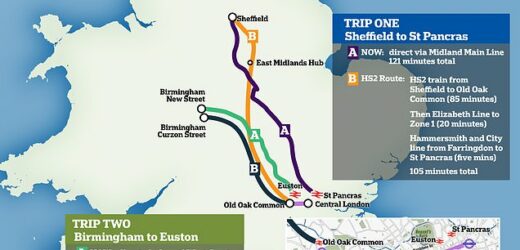HS2 will be like the ‘Ryanair of the rails’ – shall we just scrap it? JONATHAN WEBB questions the benefits of the so-called ‘high speed’ line that will dump passengers miles outside London
On the 60th anniversary of the Beeching report, should we now be asking if HS2 should be axed?
So there we have it. HS2 – which was supposed to whisk passengers from Birmingham to London in 52 minutes, will now not even reach central London, with passengers being turfed out at that most salubrious of London locations – Old Oak Common – where they will have to make their own way into the capital.
Maybe HS2 is trying to recreate the Ryanair experience, of dropping passengers off some way from their destination.
A concept image of the proposed Old Oak Common Station in west London
In an ironic twist of fate, that one wonders if it was engineered deliberately by civil servants, the announcement that HS2 would not reach Euston for many years after the line opens, was made just days before the 60th anniversary of the Beeching report – a report that sounded the death knell for many a line.
London bound passengers can count themselves lucky, for they will at least have the luxury of eventually being able to reach central London by train – those at the Birmingham end will forever have to make their way to HS2’s terminus at Curzon Street, which is some distance from the city centre.
Another irony is that Curzon Street was initially abandoned by the early railway pioneers for being too distant from the city – the present New Street having replaced it.
Why is HS2 so controversial?
The Woodland Trust, a conservation charity, calls HS2 ‘a grave threat to the UK’s ancient woods, with 108 at risk of loss or damage’.
But HS2 says only 0.29 square kilometres (0.11 square miles) of ancient woodland will be lost during the first phase. HS2 says it will reduce journey times between London and northern England and add capacity to Britain’s crowded rail network.
Critics question whether HS2 is worth its ballooning price tag – now reported more than £100billion – especially after a pandemic that might permanently change people’s travel habits.
The first phase linking London and Birmingham is due to open between 2029 and 2033, according to HS2 Ltd.
In September Boris Johnson joined the front line to see work begin on HS2, as shovels hit the ground in Solihull.
He said the ‘incredible’ scheme, launched in 2009, would deliver not just ‘22,000 jobs now, but tens of thousands more high-skilled jobs in the decades ahead’.
Transport Secretary Grant Shapps told MPs last year the first trains may not be up and running until 2031. The project has been shrouded in controversy since its birth, with campaigners warning it is ‘decimating countryside and creating a huge financial burden’.
In April wildlife presenter Chris Packham lost a High Court bid to stop ancient woodlands being dug up for the project.
There was also uproar when HS2’s annual report revealed each person working on it was costing the taxpayer almost £100,000 on average.
It also revealed chief executive Mark Thurston was paid £659,416 last year – four times as much as the PM. More than £3.3million was spent on ‘travel and subsistence’ and £802,000 on recruitment fees.
Originally presented as providing a high-speed network from Leeds/Sheffield and Manchester to London, via Birmingham, the project has been progressively descoped as costs simultaneously exploded to astronomical levels, until all that remains is the Manchester (via Crewe leg) and the Birmingham to London section – both delayed – leaving many to wonder if the Beeching axe should fall once more.
Anybody wishing to travel to London from Birmingham, who plans to arrive by train into New Street, faces a luggage laden journey on the Midland Metro tram to Curzon Street before they can join their HS2 service.
To add insult to injury, ministers refuse to be drawn on ticket prices – leaving many sceptics to wonder if the trains will be the preserve of business travellers.
Estimated as having a final cost of £33bn in 2010, 13 years later this has shot up to £100bn and will now rise significantly further, thanks to the recent government announcement, where the project is ‘rephased’ for two years – Crewe not expected to be reached until 2036 and Manchester in 2043.
Although the Government has publicly committed to reaching Euston – eventually – a best case scenario will see HS2 trains terminate at Old Oak Common for almost a decade.
One rail manager wittily saying that it’s like ‘Eurostar services terminating at Croydon!’
‘Ah, but we need the extra capacity that HS2 will bring’ cry its supporters – sneering at anybody who objects – calling them ‘NIMBYs’ – while at the same time brushing aside concerns that the people they abuse are the ones who will suffer the greatest damage to their environment, yet receive non of the benefits that HS2 supposedly offers.
Interestingly, very few, if any, of the high profile supporters live on route, so will not face any disruption or destruction.
Some of the most vocal rail press even decry those who take domestic flights over rail travel, failing to mention that they benefit from free rail travel.
Is there really enough demand to justify extra trains? The pandemic changed everything and the season ticket holder can no longer be relied upon to make up the bulk of passengers.
Instead, we have seen a significant shift towards people travelling for leisure and a shift to hybrid working where many former office bound jobs are now partially or fully work from home.
Leisure travellers are renowned for price sensitivity – one knows things are desperate when Avanti , which operates trains along the West Coast Main Line to Euston, starts offering cheap tickets, the only catch being that that passengers can’t choose what train they travel on or what date – both these details being left to the discretion of Avanti.
Not such a bargain after all. As for the claim that HS2 will ease pressure on other routes – the converse is likely to be true at the parts of the route where HS2 ends, something that supporters are reluctant to admit.
Passengers arriving off HS2 at Old Oak Common, for example, would surge onto the Elizabeth Line towards Euston, filling up the trains before they even reached the busiest central London stations.
Supporters also point to Japan and its bullet trains, but once again ignore inconvenient truths such as Japan being a much larger country and that many lesser well used lines have been closed or are threatened wth closure.
Could we see HS2 suck out funding from the industry – railway maintenance isn’t cheap – putting branch lines and secondary routes at risk?
The Community Rail organisation (which receives £500,000 from the Department for Transport, plus significant sums from train operators) could also be hit in any cutbacks, with eyebrows being raised at the large number of management staff employed – a recent advert for a director of communications offered a salary of £45,000 – plus disquiet among some of the community groups about management style.
Baron Beeching was chairman of British Railways and a physicist and engineer. He became a household name in Britain in the early 1960s for his report ‘The Reshaping of British Railways’, commonly referred to as ‘The Beeching Report’, which led to far-reaching changes in the railway network
The HS2 high-speed rail line is a ‘loss-making’ project, which will not be completed before 2041, Conservative MP Andrew Bridgen warned the House of Commons
Mark Thurston, CEO of HS2 stands by the project, which is already costing three times more than initially expected
What can passengers expect in time savings once HS2 opens? For the first decade at least, time savings will be negligible.
Currently an Avanti train from Birmingham New Street to Euston takes approximately 90 minutes.
Once the line opens to Old Oak Common this will be reduced to a around 70 minutes, comprising of 50 minutes to Old Oak Common, then 20 minutes on the Elizabeth Line, including walking between platforms and changing trains.
Those lucky HS2 passengers from Manchester will do even better – saving a massive 40 minutes on current timings.
However, should there be a delay in extending the Elizabeth Line to Old Oak, travel times will be little better, or even worse, than they are now, due to there being no Tube link at Old Oak Common.
Is HS2 dead? I suspect not, although the Government has announced that work is to pause at Euston for at least two years and the site made secure until work resumes.
Various opinion polls suggest that public support for the scheme is waning, or at best a large proportion of the population are apathetic towards it – although one would never know it reading the frenzied support for it in many of the rail enthusiast magazines.
While supporting HS2 is hardly going to be a vote winner, supporting reopening lines closed by former transport secretary Ernest Marples could well be and would benefit society more by connecting isolated villages to the national network once again.
Let’s hope, for his sake, that the current incumbent, Mark Harper, doesn’t have to follow his predecessor and skip the country on the night ferry.
HS2 costs soared another £1.7BILLION during Covid with total budget swelling to £106bn
The cost of the controversial HS2 high-speed rail project increased by a further £1.7billion during Covid due to social distancing measures and work suspensions caused by the pandemic.
Coronavirus and lockdown restrictions disrupted work at most HS2 sites, causing further delays which have put even more strain on the UK’s biggest infrastructure project.
Similar pressures have been reported by industry experts in projects ranging from Crossrail and the A303 Stonehenge tunnel to the Tideway tunnel and the Hinkley Point C nuclear power plant in Somerset.
As a result of work suspensions, social distancing measures, and reduced productivity, costs have soared by around £1.7billion – another increase on the project’s estimated £106billion budget.
Opposition to the project is mounting, with local anger contributing to the Tory by-election defeat in Chesham and Amersham. The new line is due to run through the Buckinghamshire constituency.
The costs associated with Phase 1 of the line between London and Birmingham have increased by as much as £800million, people close to the project told the FT.
That increase follows an £800million rise announced by HS2 in October, including money spent on remediating the terminus site at Euston in London.
The price of the Birmingham Interchange station also rose by £100million to £370million even before contractors have been appointed.
One contractor close to the project said that HS2 Ltd, the state-funded body responsible for delivering the line, ‘doesn’t really know how much Covid has added’. HS2 Ltd declined to comment when approached by MailOnline.
Construction started on Phase 1 of the London to Birmingham line in August 2020 after more than a decade of planning. But the ballooning costs could add to Treasury fears that HS2 will be a black hole for taxpayers.
The Department for Transport conceded to MailOnline that there had been ‘unavoidable costs’ arising from the coronavirus pandemic.
Source: Read Full Article







